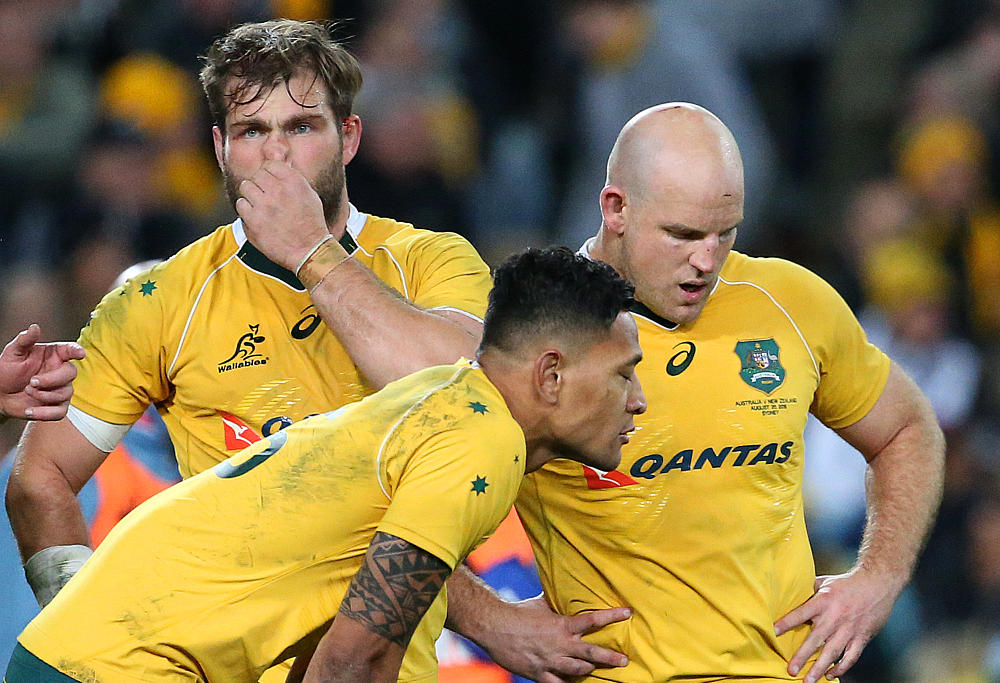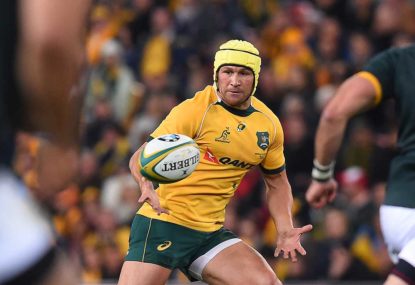New Zealand 42 – Australia 8. The biggest defeat for the Wallabies in Australia. A thrashing from the All Blacks and, as sure as you can be about anything in sport, another year of the Bledisloe Cup remaining in New Zealand.
In the 65th minute of the Test, with the score line 42-3, the Fox Sports television coverage flashed these statistics on the screen. Metres gained – Wallabies 324, All Blacks 798; missed tackles – Wallabies 29, All Blacks 8; linebreaks – Wallabies 1, All Blacks 9; advantage line gain percentage Wallabies 56, All Blacks 74.
These are the statistics a top tier nation would expect to create against a minnow rugby power. They are not the statistics that a top tier rugby nation should concede against any other team.
The 39-point advantage the All Blacks had at the time represented, if it had been maintained, the biggest winning margin ever in Australia-New Zealand rugby Tests going back to 1903.
Nick Phipps was one of the few Wallabies to emerge with any credit from the Test, although he played on the wing to cover for all the injured backs. His try at the end of the Test, made through some courageous stepping through a black wall of defenders, meant that the Wallabies scored one try to the six scored by the All Blacks.
In boxing terms, the Wallabies were knocked out in the second round of a 10-round title fight.
You could tell the All Blacks were mentally and physically up for the Test when they used their cut-throat Kapa o Pango haka. Those thousands of New Zealanders at the stadium, blobs of black amidst the massive fields of Wallabies golden daffodil scarves in the 65,328 crowd, immediately roared their approval.
The All Blacks had come to play. And play they did in a manner few teams ever in the history of the game have done.
All the Michael Cheika motivational rubbish about them not respecting the Wallabies was blown away in a brilliantly ruthless exhibition of the modern catch-pass-run modern game. The highest respect an All Blacks side can pay to their opponents is to play superbly against them. And this is what they did.
The Wallabies, on the other hand, had turned up to pay rather than play. They paid for having no system in their play. After a couple of phases someone just kicked the ball away. Bernard Foley dropped so far back in the pocket, you could swear he was playing at fullback rather than as the supposed playmaker.

The Wallabies lineouts were a shambles and they paid for that by losing a 5m lineout when they were set up for a rolling maul early on in the Test when it was still a contest. All Blacks were winning ball on the Wallabies’ throws in a way that led you to believe Dane Coles rather than Stephen Moore was throwing in. There was some ironic cheering when after about 30 minutes of play, the Wallabies finally won a lineout on their own throw.
In modern times, the All Blacks score on average around 27 points a match. I was searching in my mind throughout the match to find or work out the method the Wallabies were using or trying to use to score the four or five tries that would bring them close to the All Blacks average score, and a Wallabies win.
I couldn’t find it. You are not going to beat the All Blacks by kicking the ball to them. Their game is based on running the ball back through the disrupted defensive lines of their opponents. But this is what the Wallabies did, even after half-time when they desperately needed many points to make a game of the Test.
Ironically, during the pre-Test warm-ups, the Wallabies ran through several sequences of clever back line movements. I was watching pretty closely but I couldn’t see any of these sequences being used in the Test.
On the other hand, the All Blacks ran through their pass and catch drills and they brought these drills to the Test. Sometimes the pass and catch efforts had a Harlem Globetrotters brilliance in execution and effectiveness about them.
Essentially, though, we had one side, the All Blacks, playing as a team and the Wallabies playing (or not playing actually) as individuals without much concern, or so it seemed to me, for the interests of the team.
I am going to say something now that is provocative. But it needs to be said. Michael Cheika’s decision to bring back the Giteau Law players, Matt Giteau, Drew Mitchell, Adam Ashley-Cooper and Will Genia is destroying and probably has, for 2016, the inclusive, self-sacrificing, team-first culture of the Wallabies.
This decision meant that Nick Frisby, who should be the next Wallabies long-term half-back, is not even in the squad.
It meant that Samu Kerevi, a big, fast, enthusiastic youngster, a runner who gained more metres that just about any other Australian in Super Rugby, was not in the starting 23. Kyle Godwin, named by Nicholas Bishop in The Roar, as a possible long-term Wallabies inside back and who has a left foot kick, is not in the squad.
It meant that Rory Arnold and Sam Carter, the big second rowers who powered the Brumbies maul and lineout, were not even in the squad.
It meant that promising young outside backs like Andrew Kellaway, a record try-scorer in the World Rugby under-20 championship, ahead of Julian Savea, are not in the squad.
I watched the ‘Giteau Law’ players during the Test. It made for horror show viewing.
Will Genia, singled out by Cheika as playing well, missed a tackle on Ryan Crotty to let in the All Blacks’ first try. There was no sign of the Genia break-outs, or his former ability under the high ball. He hasn’t played for nine months and has cartilage problems.
He shouldn’t have been brought back from France.
Adam Ashley-Cooper had his first touch in the 34th minute. He was outplayed by Phipps as a Wallabies winger!
He shouldn’t have been brought back from France.
Matt Giteau almost dropped his first catch. Then got himself caught up in a ruck/tackle. Due to an unfortunate injury he was off the field after 11 minutes! That was longer than he spent on the field than the Rugby World Cup final.
He shouldn’t have been brought back from France.
Drew Mitchell was not selected in the starting 23. He apparently hasn’t played any rugby for nine months. He is keeping the Kellaways of Australian rugby out of the Wallabies. Why has he been selected for the squad?
He shouldn’t have been brought back from France.
To this list, I would add players like Kane Douglas, Dean Mumm, Stephen Moore, and David Pocock (going on a sabbatical anyway) whose future in the Wallabies should be limited to The Rugby Championship.
Cheika needs to do what Steve Hansen did with the All Blacks in 2012, after they won the 2011 Rugby World Cup. He introduced nine new All Blacks who displaced veterans whose best days were in the past. All nine of these new players are in the current All Blacks squad and are now among the senior players in the team.
Now we get to the damage done to the culture of the Wallabies by the return of the Giteau Law players. Their very presence is divisive. They have left Australia. No one is criticising them for this. But by allowing themselves to be rushed into the Wallabies squad, even though their best days in the jersey, are long gone, they are indulging themselves at the expense (literally and figuratively) of the younger, better players who are the future of Australian and Wallabies rugby.
I got a very real sense of the self-indulgence and smug self-interest of Giteau, Ashley-Cooper and Mitchell a couple of weeks ago when they tweeted their opposition to an article I wrote that pointed out Cheika’s Giteau Law back-to-the-future plan for the Wallabies would “end in tears.”
Being attacked for what I have written, as ardent readers of The Roar will know, is nothing new for me. So people reading what I say next should understand this. It is why the three old amigos have tweeted that is the important, and the repercussions of their attitude as far as the needed re-building of the Wallabies is concerned.
After the tweets, Mitchell then accused me (in a name and shame attempt) of being “negative” and “ill-formed.” He did this on the ARU’s own website and then in The Daily Telegraph.
Once again, let me make it clear, the fact of these existing are irrelevant, as far as I am concerned. It is what they mean for the damaging of the inclusive culture of the Wallabies that is the real concern.
Here is what Mitchell said about my insistence that bringing back the veterans from France will hold back the development of the next generation of Wallabies: “I just think it was ill-informed, there was a negative intent to it. We’re here as much for the off-field stuff as the on-field. We want to help the younger guys and Cheika has wanted that.”
We can see from the pathetic performance from the Wallabies on Saturday night just how much the presence of the French veterans has helped the younger players. Many people have told me that have never seen a worse performance from the Wallabies, even in the Woeful Wallabies days, as that provided on Saturday night.
Moreover, can anyone tell me what help Ashley-Cooper, Mitchell, Giteau and Genia have been to the young players, on the rise, the future of the Wallabies, who they have kept out of the squad or the starting 23?
This disaster has been nothing more than a cover-up for Cheika’s woeful selection policies, an over-wrought coaching style that confuses motivation with proper preparation, his penchant for playing veterans over young talent and a disregard for the civilities of discourse and conduct in a rugby context.
Who going to take any responsibility for the now-obvious disastrous impact the Giteau Law players are having on the Wallabies culture and public discourse about rugby matters?






























































































